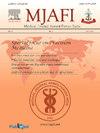Evaluation of an interprofessional collaborative practice training module for the management of children with autism spectrum disorder
Q2 Medicine
引用次数: 0
Abstract
Background
Protocols instituted for behavioral treatment and skills training programs for the management of autism spectrum disorder (ASD) suffer from lack of collaborative approaches. The tenets of interprofessional collaborative practice (IPCP) focus on preparing a panel of health care professionals (HCPs) from different professions who can work together to enable the common goal of ensuring that children with ASD can participate in society. This study was designed to pilot this approach through an IPCP training module on ASD for care providers from multiple professions.
Methods
An interventional study with pre-post analysis began with formation of the interprofessional (IP) team, who developed an IPCP module, addressing the knowledge and skills needed for the collaborative management of neurodevelopmental issues of children with ASD. This module was delivered through an online training workshop using various teaching learning methods to the participants from seven different health professions after obtaining informed consent. Perceptions of interprofessional collaboration and competencies of IPCP were assessed using standard IP tools and reflective summaries and analyzed through a mixed-methods approach.
Results
A total of 42 HCPs from seven professions, including speech and hearing, occupational therapy, clinical psychology, physiotherapy, pediatrics, nursing, and pedodontics, participated in the study. Pre-post analysis of PINCOM-Q and Dow-IPEC data and thematic analysis revealed a significant difference in the perceptions of interprofessional collaboration and competencies’ levels of IPCP.
Conclusion
This study suggests that use of IPCP principles in the training of professionals working with ASD is a promising and feasible option to develop more competent health professionals. The training enhanced the abilities of professionals to work in field of ASD as conveyed by the participants. They also expressed confidence in the knowledge of IP core competencies after the completion of the module.
自闭症谱系障碍儿童管理跨专业合作实践训练模块的评估
为管理自闭症谱系障碍(ASD)而制定的行为治疗和技能培训计划的协议缺乏合作的方法。跨专业合作实践(IPCP)的原则侧重于准备一个由来自不同专业的卫生保健专业人员(hcp)组成的小组,他们可以一起工作,以实现确保自闭症儿童能够参与社会的共同目标。本研究旨在通过IPCP ASD培训模块对来自多个专业的护理提供者进行试点。方法一项介入研究和前后分析始于跨专业(IP)团队的组建,该团队开发了一个IPCP模块,解决协同管理ASD儿童神经发育问题所需的知识和技能。该模块是在征得知情同意后,通过在线培训讲习班使用各种教学方法向来自七个不同保健专业的参与者提供的。使用标准知识产权工具和反思性摘要评估了对专业间合作和知识产权计划能力的看法,并通过混合方法进行了分析。结果来自语言听力、职业治疗、临床心理学、物理治疗、儿科学、护理学、儿科学等7个专业共42名HCPs参与研究。PINCOM-Q和Dow-IPEC数据的前后分析以及专题分析显示,对IPCP的专业间合作和能力水平的看法存在显著差异。结论在ASD专业人员的培训中运用IPCP原则是培养更多有能力的卫生专业人员的一种有希望和可行的选择。培训提高了专业人员在ASD领域工作的能力,正如参与者所传达的那样。他们亦表示,在完成课程后,对知识产权核心竞争力的知识有信心。
本文章由计算机程序翻译,如有差异,请以英文原文为准。
求助全文
约1分钟内获得全文
求助全文
来源期刊

Medical Journal Armed Forces India
Medicine-Medicine (all)
CiteScore
3.40
自引率
0.00%
发文量
206
期刊介绍:
This journal was conceived in 1945 as the Journal of Indian Army Medical Corps. Col DR Thapar was the first Editor who published it on behalf of Lt. Gen Gordon Wilson, the then Director of Medical Services in India. Over the years the journal has achieved various milestones. Presently it is published in Vancouver style, printed on offset, and has a distribution exceeding 5000 per issue. It is published in January, April, July and October each year.
 求助内容:
求助内容: 应助结果提醒方式:
应助结果提醒方式:


